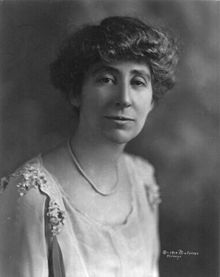Jeannette Rankin
| Jeannette Rankin | |
|---|---|
 |
|
| Member of the U.S. House of Representatives from Montana's 1st district |
|
|
In office January 3, 1941 – January 3, 1943 |
|
| Preceded by | Jacob Thorkelson |
| Succeeded by | Mike Mansfield |
| Member of the U.S. House of Representatives from Montana's at-large district |
|
|
In office March 4, 1917 – March 3, 1919 |
|
| Preceded by | Tom Stout |
| Succeeded by |
John Evans (1st district) Carl Riddick (2nd district) |
| Personal details | |
| Born |
Jeannette Pickering Rankin June 11, 1880 Missoula County, Montana, U.S. |
| Died | May 18, 1973 (aged 92) Carmel, California, U.S. |
| Political party | Republican |
| Alma mater |
University of Montana, Missoula Columbia University University of Washington, Seattle |
Jeannette Pickering Rankin (June 11, 1880 – May 18, 1973) became the first woman to hold national office in the United States when she was elected to the U.S. House of Representatives in 1916 by the state of Montana as a member of the Republican Party. She won a second House term 24 years later, in 1940.
Each of Rankin's Congressional terms coincided with initiation of U.S. military intervention in each of the World Wars. A lifelong pacifist, she was one of 50 House members (total of 56 in both chambers) who opposed the war declaration of 1917, and the only member of Congress to vote against declaring war on Japan after the attack on Pearl Harbor in 1941.
Rankin was also instrumental in initiating the legislation that eventually became the 19th Constitutional Amendment, granting unrestricted voting rights to women; and she championed the causes of gender equality and civil rights throughout a career that spanned more than six decades.
Rankin was born on June 11, 1880, near Missoula, Montana, nine years before the territory became a state, to schoolteacher Olive Pickering and Scottish-Canadian immigrant carpenter and rancher John Rankin. She was the eldest of six children, including five girls (one of whom died in childhood) and one brother, Wellington, who would become the state's attorney general, and later, an associate justice of the Montana Supreme Court.
As an adolescent, Rankin cleaned, sewed, and helped care for her younger siblings, in addition to sharing in the outdoor work and daily farm chores. She helped maintain the ranch machinery, and once single-handedly built a wooden sidewalk for a building owned by her father so that it could be rented. Rankin later recorded her childhood observation that while women of the 1890s western frontier labored side by side with the men as equals, they did not have an equal political voice—nor a legal right to vote.
...
Wikipedia
